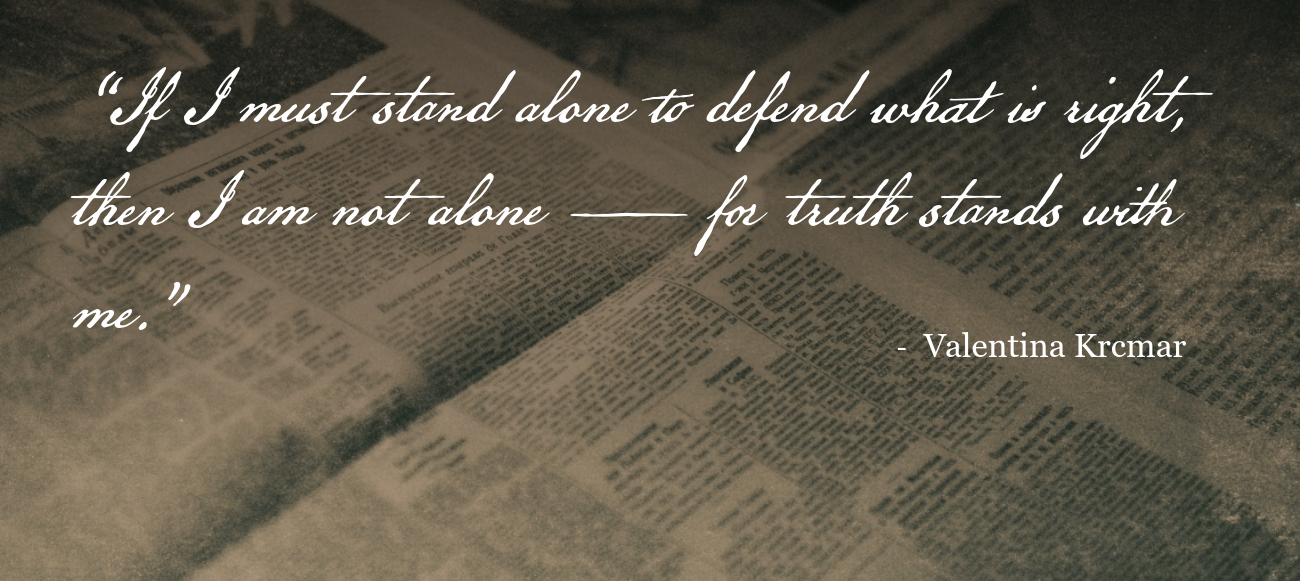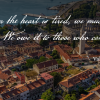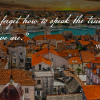
Published: March 15, 2003
View the Original Newsletter: Iskra-119.pdf
About This Issue
Iskra No. 119 carries both heaviness and humility — a publication written under strain yet filled with integrity. Valentina Krčmar opens with honesty about the challenges facing Iskra itself: financial strain, dwindling support, and the emotional toll of community division. Still, her words radiate courage. She reminds readers that truth-telling is not an act of rebellion, but of conscience.
Amid continued tensions surrounding the Croatian Credit Union and internal diaspora politics, Valentina reflects on broader questions — about faith, trust, and the responsibility of journalists to stand firm even when criticized. The issue also includes heartfelt tributes, practical advice for daily living, and reports from Croatia’s political and cultural landscape, showing that even in hardship, the community continues to grow, remember, and give thanks.
Editorial: “The Pain of Writing the Truth”
Valentina’s editorial is raw and unguarded. She begins by confessing that this issue almost didn’t go to print — that the burden of attacks, accusations, and exhaustion nearly silenced her. “It hurts when people I’ve known for decades doubt my honesty,” she admits. “But to stay silent would hurt more.”
She recounts the toll of recent months — the HKZ (Croatian Credit Union) dispute still unresolved, legal threats looming, and supporters growing weary. Yet, she defends her decision to continue publishing as both a duty and an act of love. “If Iskra does not write,” she says, “then the record is lost. We owe the truth to history, not to comfort.”
Her editorial also praises small gestures of kindness — readers who sent notes of encouragement or financial help. “Every cheque, every word, every smile that says ‘keep going’ means more than I can say,” she writes, her gratitude woven through the fatigue.
National & Political News: “A Country Seeking Direction”
From Zagreb, the issue reports on Croatia’s shifting political climate in early 2003. The government under Ivica Račan continues to struggle with reforms tied to European Union accession, including privatization and judicial accountability. Public frustration grows, especially among war veterans who feel left behind in the new economy.
Valentina reprints an opinion piece questioning whether moral leadership has faded in post-war Croatia: “We fought for freedom, but do we live it?” The tone is reflective, not partisan — a call to conscience rather than criticism.
Community News: “Faith and Friendship in Difficult Times”
Despite tension and fatigue, the Toronto Croatian community remains vibrant. Valentina highlights parish events, concerts, and cultural gatherings that restore hope and solidarity. She thanks the Croatian Martyrs Parish for its constant support of Iskra and recalls the moving Mass held in memory of her late mother, Milica Horvat.
A touching report follows from Fond Slavonija, whose members raised funds to support Croatian families abroad. “In these small acts,” she writes, “our homeland continues to live.”
She also responds to a letter from a reader in Windsor who defended her editorial integrity, calling it “a light in dark times.” Valentina thanks him publicly and uses the moment to reaffirm her belief that open dialogue — even uncomfortable dialogue — is essential for community growth.
Culture & Heritage
The cultural pages celebrate both Croatian creativity and humor. The issue reprints a short piece on Josip Restović, a poet and humorist known for his sharp, affectionate take on village life. Another feature, “Marija iz Požege”, tells the story of a woman who devoted her life to nursing war orphans, an example of compassion that transcends politics.
A charming note follows in Valentina’s own handwriting — a short reflection on the power of reading: “Books are like bread. They feed us quietly, and we only realize how hungry we were once we begin.”
Health & Wellness
Dr. Darko Desaty contributes another educational piece — this time on cholesterol and heart disease. He explains the importance of balancing HDL and LDL levels and warns against excessive animal fats, while encouraging regular exercise and simple, traditional meals.
Another article titled “Menopause — A New Beginning” reframes midlife not as decline, but as transformation. Written in a friendly, conversational tone, it encourages women to approach aging with acceptance and humor.
Everyday Life & Humor
The humor section offers respite from the heavier themes. Folk jokes, anecdotes, and short verses lighten the mood — including a funny story about a man who mistakes his wife’s hair dye for shoe polish, and a playful piece about “how to recognize a true Dalmatian at a wedding.”
Valentina’s editorial team closes the section with a proverb: “Laughter doesn’t erase pain, but it reminds us we are still alive.”
In Memoriam
The issue includes a tribute to Marija Krnić, a long-time supporter of Iskra and active member of the Mississauga parish community. Valentina recalls her quiet generosity — “never loud, always kind.”
She also remembers Father Juraj Mikolić, a Franciscan who had served Croatian parishes in Canada since the 1970s. His devotion to faith and family life, she writes, will be remembered by many.
Closing Reflection
In her final note, Valentina returns to the question that defines the issue: why continue? Her answer is simple and profound — because silence is complicity. She ends with words that blend resilience and tenderness:
“We do not write to judge. We write so that no one can say they did not know.”
Her message to readers is one of gratitude and quiet persistence. She thanks them for keeping Iskra alive — not just as a newsletter, but as a moral compass for a community navigating its own growing pains.




